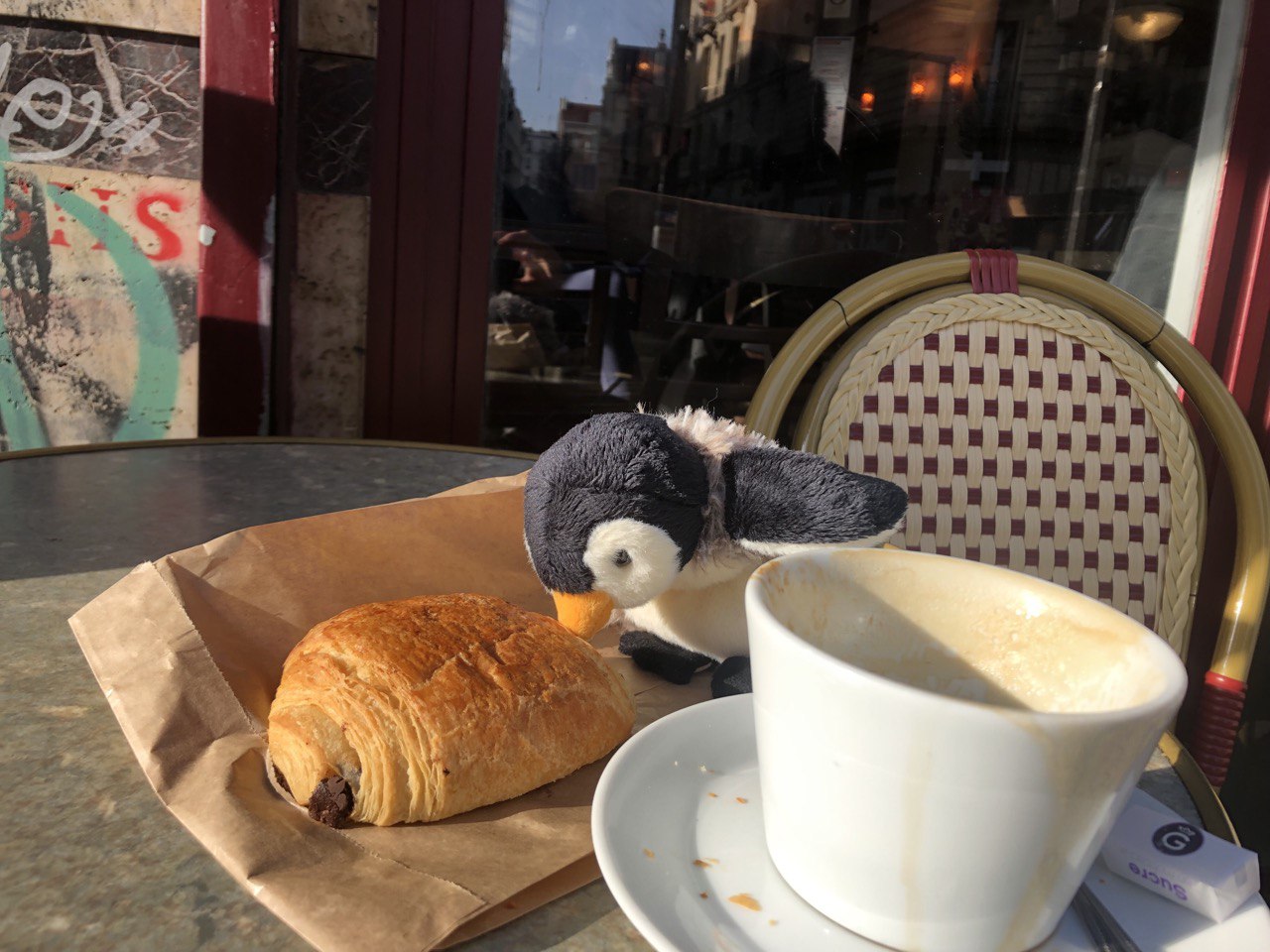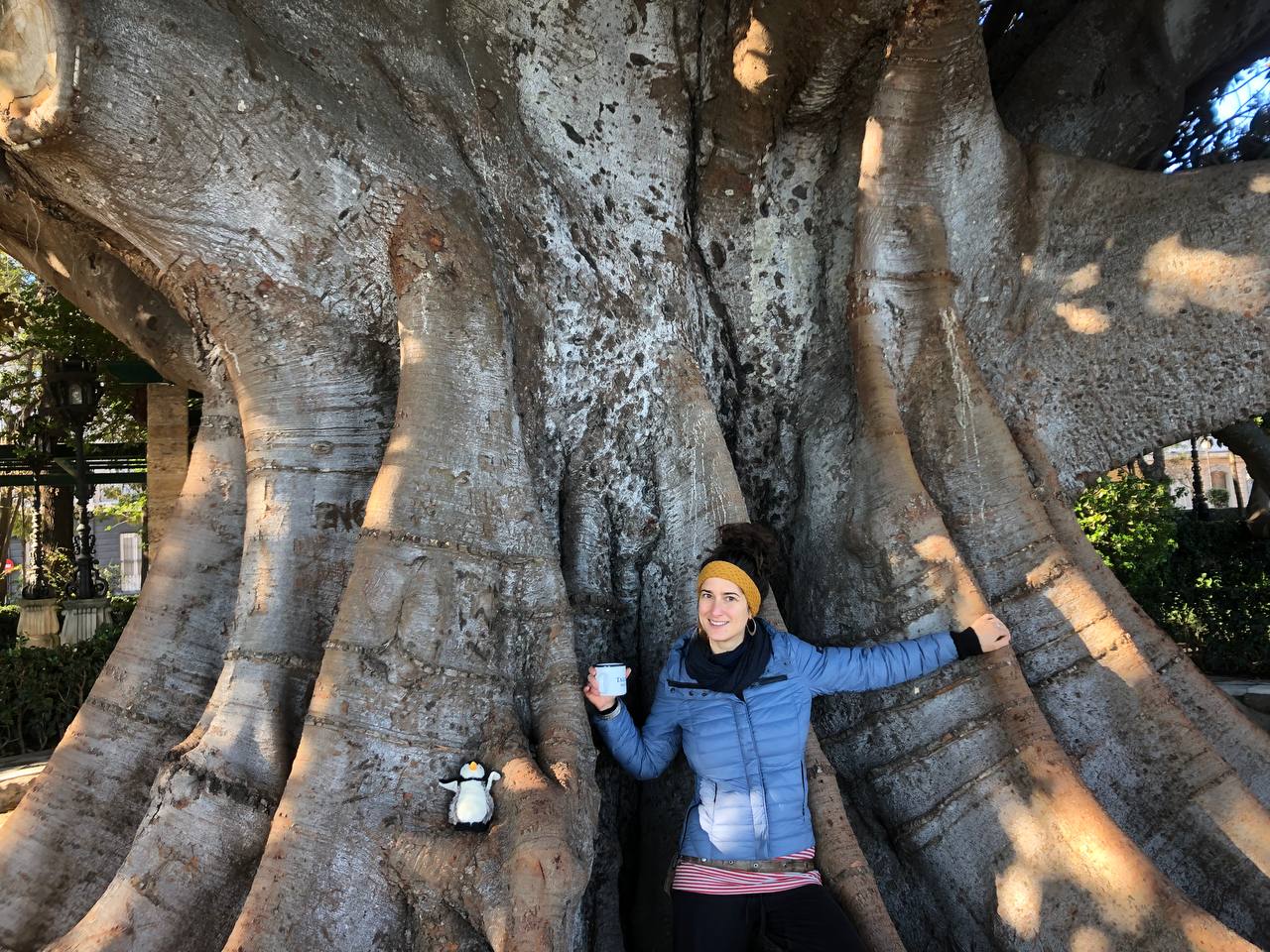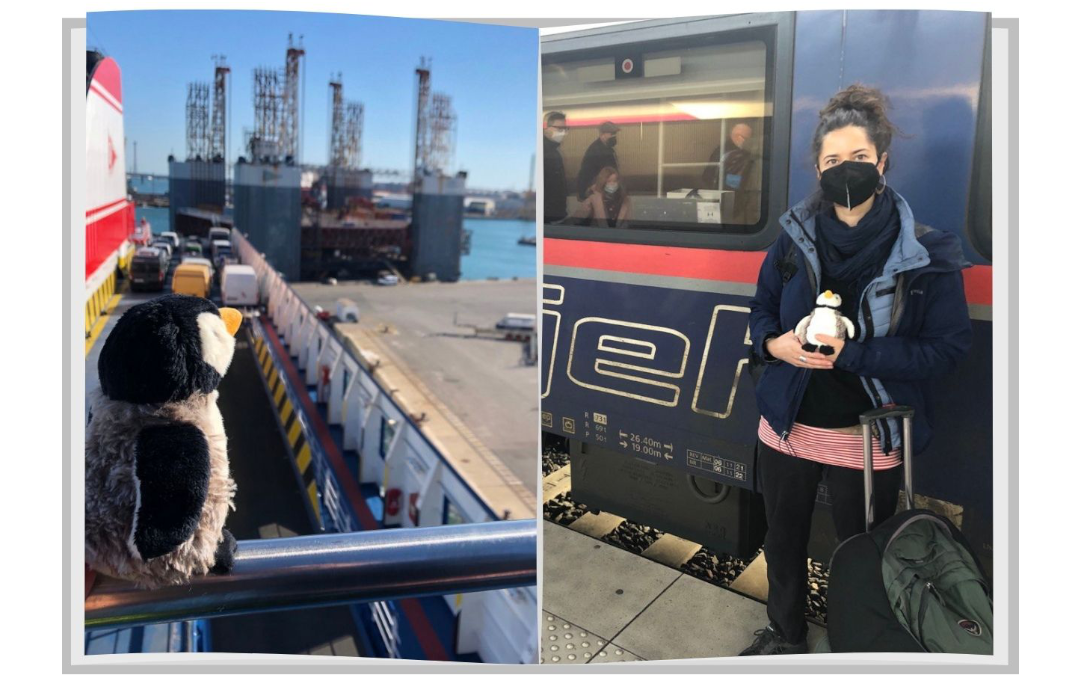I didn’t think it was possible to get to the Canary Islands so quickly. The Canaries are basically next to West Sahara and 4.000 kilometres from the Stay Grounded office in Vienna, Austria. It only took us four and a half days to get there. Of course compared to a five-hour flight, it sounds like a lot. But compared to the distances we crossed by train and ferry, the cultures we encountered, the people we met, it’s a little. I’m glad we’ll get to take more time on the journey back home in a few weeks’ time…
I’m Magdalena, one of the co-founders of the Stay Grounded network, and I decided not to just speak of grounded slow travels, but to do it. On our 10-week journey, I’ve been accompanied by my partner, a growing baby in my belly, and Pingu, our little penguin friend – a pretty cool bird that is used to staying grounded. (Pingu is a bit more into selfies than I am, which is why she’ll be sharing travel photos on the Stay Grounded social media channels.)
So why did we leave for a 10-week travel in the first place? For years I’ve been wanting to visit the islands that are home to a good friend of mine. She had been telling stories about wonderful hikes, lonely beaches, and how the taste of the Canaries could be captured in the form of collected herbs, smoked goat cheese, oranges and avocados… But I knew I wanted to have enough time to get there, to enjoy not only the stay but also the journey. And hopefully without causing too much harm along the way.
Some challenges to overcome
The first challenge was getting the time off work. I talked to my Stay Grounded team and am lucky to have colleagues who supported me in taking ten weeks off. Visiting far off locations needs time, and this requires changed working conditions and the option for sabbaticals. Systemic challenge number one: The chance to take such a large chunk of time away from the workplace is a challenge for most of the working population. This is a challenge that is more likely to be overcome through increasing collective pressure from employees and trade unions.
The second challenge was booking the tickets. Oh my… I didn’t imagine it would be so difficult on a continent with an intact train infrastructure. But it was! With a good European booking system still lacking (due to the resistance from Germany & France), every border crossing means a new webpage for booking tickets and a bigger risk of missing connecting trains without any financial security for reimbursement for those missed connections or if schedules don’t align. Also, who knew there would be so many options to get to the south of Spain! I found myself asking, which would be the quickest and cheapest?
But with the help of some great overview booking pages, I finally managed to book everything. There are also good travel agencies one could turn to, but planning the long travel myself was part of the experiment. I booked two months in advance, and the price turned out to be okay, especially when considering the distance. But sure, 330 € is comparably more than if I had taken the 50 € flight. Systemic challenge number two: There needs to be fairer pricing. Something that has helped us stay within a low budget has been always finding a bed or sofa to lay our heads on at the end of a day, by staying with people from our great network of friends and activists connected to Stay Grounded. I cannot say enough about how lucky I feel being able to visit comrades and have a place to stay along the way!
12.2.: Night train Vienna-Paris, 50 €
13.2.: Eight-hour train Paris-Barcelona, 80 €
14.2.: Twelve-hour train Barcelona-Cádiz, 28 €
15.2.: 32-hour ferry Cádiz-Las Palmas, 175 €
Onboarding the travel
My 10-week travel started after a Stay Grounded team meeting in Vienna. I boarded the recently re-established night train from Vienna to Paris. I didn’t book a bed, hoping for some free seats where I could lay down and I was lucky to find a totally empty cabin. I transformed the flexible seats into a king size bed, rolled out my sleeping pad and had the best night’s sleep in a week. The smooth shaking and rattling of the train sounded like a lullaby to our ears – me and Pingu, that is – and the gentle movement of the train rocked us to sleep. I woke up at 9 am, just in time to refresh myself in the clean bathroom and listen to the trilingual welcome announcement from the Austrian night jet.
I met my partner in Paris where we had a few hours to walk slowly stroll through the lazy Sunday morning streets of Paris. We walked from Paris de l’Est station to Gare de Lyon, stopping at a café to enjoy a coffee and ‘pain au chocolat’. Excitement started trickling in…it was really happening! I had started my journey and wouldn’t be back for ten whole weeks!




The French Train à Grande Vitesse aka „high-speed train“ aka TGV from Paris to Barcelona was unspectacular but comfortable. I watched the landscape pass quickly by, wrote in my diary, listened to a great podcast, and then switched trains in Valence in southern France. Meanwhile, Pingu had a good time at the children’s play station. We arrived almost too soon in Barcelona – the city where just three years ago, the Stay Grounded movement gathered for the Degrowth of aviation conference. Barcelona is also the site of a recent win by protestors against over-tourism and the environmental crisis, where their efforts resulted in the expansion of Barcelona airport being put on ice. We stayed at the home of one of the activists from the degrowth conference. On our way back we had more time to enjoy visiting the great people and network we have cultivated in Barcelona.
We only stayed in Barcelona one night since our train to the south of Spain left the next morning. We had a twelve hour ride without changing. We passed through an agricultural food basket of southern Europe where little more adorned the land than orange plantations, artichoke fields and blooming almond and olive tree orchards. Movies were shown on TV screens hanging from the ceiling inside the train cabin and although it’s something I personally dislike, I must admit I succumbed to watching after awhile, when my diary and book got boring. In the evening we arrived in Cádiz and we stepped out of the train into a totally different climate. A warm breeze from the sea and the picturesque white town welcomed us. We slept at a friend’s of a friend’s of a friend’s place and were surprised to find ourselves in one of the little old towers above the half island city with a beautiful panorama! We had half of the next day to explore the streets, find enormous trees, chat with locals, and enjoy a great avocado baguette breakfast.




The ferry-tale
From Cádiz we boarded an enormous ship, and soon discovered that we were among only a handful of passengers who embarked without a car. The ferry ride ahead of us was 32 hours – Why would anyone prefer 32 hours to just a few hours on a plane? You might be surprised to know that I would have loved taking even more time to get there had I been able to find a sailing ship to take us, but finding one is not an easy task. By the way, did you know that almost 100 years ago, the Canary Islands served as stop-over for an airship line from Germany to Brazil, which was only a five day journeyand that it was a highly demanded route? While our ferry was fuelled by polluting heavy oil, I wondered, how long it might be before ferries will be propelled with wind and solar power rather than with polluting heavy oil? Until then, it will remain only a fairy tale when people speak of shipping as being an environmentally friendly mode of transport. I supposed then, that better transport alternatives would be the third systemic challenge.
While this slow travel is certainly not carbon neutral, any type of travel – except perhaps a hiking or biking trip – can’t escape this carbon dilemma. But taking a long ferry ride is something I will probably only do once in my life – since reducing if not eliminating fossil-fuelled travel is the goal. While aboard the ferry, we got all-inclusive food three times a day, and instead of taking a cabin, we slept on the deck outside – by full moon. And yes, it was just as romantic as it sounds… The first hours out at sea, I had a queasy feeling but soon after got my sea legs and the feeling went away. During the day, we enjoyed the sun, the blue sky and ocean, read, chatted with people, and were excited upon spotting the mountainous islands in the distance…
The dilemma of being a tourist…
For me as a German it felt strange being at the Canary Islands which are so far off into the Atlantic. The islands have become such a popular German holiday destination thanks to the warm winters and discount airlines. Many have fallen in love with the islands, which once served as an experimental field for the later colonization of greater parts of the World. And they are, in a certain sense, still being ‘colonized’ by tourists and people who can afford a second home during cold European winters.
The population has (for different reasons) grown enormously, having become the most densely populated region of the European Union. Rental prices are extremely high, water is scarce, while trash is piling up and oil to be burned for energy use, as well as the lion’s share of the food and consumer goods, are brought in by fossil-fuelled ships. These islands are quite expensive, while the poverty of locals – who often don’t have the luxury of taking vacations themselves – becomes quickly visible when leaving the typical tourist tracks. While walking through the colourful city centre of Las Palmas, it feels uncomfortable to be contributing to all of this, even if my intention is to travel in the most conscious way. Travelling, which has always been part of societies, has brought important exchanges of knowledge and goods, and can expand our horizons. So the choice to travel isn’t do or don’t. This brings us to systemic challenge number four: how can we rethink and reshape the way we organize tourism?

